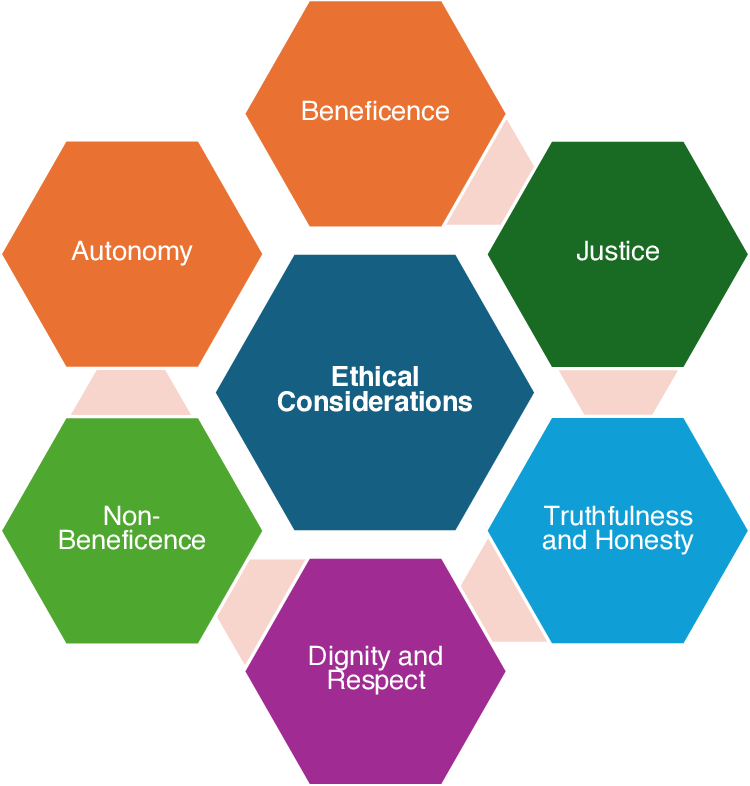
Healthcare is more than just the physical treatment of patients. It includes the preservation of patient’s rights and dignity. All principles of clinical ethics contribute greatly towards the protection of patients’ autonomy and advocacy including promotion of justice in the provision of healthcare. This blog will discuss some ethical issues that are of great concern as well as some details on the need to advocate for patients’ rights and how practitioners can cope with these issues.
What are the main ethical concerns in healthcare?
The main ethical concerns in healthcare include patient autonomy, confidentiality, informed consent, and equitable access to care.
Ethical issues are more prominent with the concerns of healthcare. There are situations where the patient agrees to accept a certain treatment but the physician disagrees or a physician is limited by the resources available. Some of these issues are how to ensure that patients are informed about the treatments they undergo, what to do with the medical records, and how to promote measures aimed at increasing access to health services among the marginalized sectors. In order to mitigate stresses on the ethical principles, both legal and ethical standards must be complied with all the time.
How do healthcare providers advocate for patients’ rights?
Healthcare providers advocate for patients’ rights by ensuring informed consent, respecting autonomy, and maintaining confidentiality.
The term “advocacy” in healthcare practice is not solely for caring for patients but also involves fighting for the patients’ rights. This involves assessing if the patients have received information adequate enough before agreeing to any procedure, honoring individuals’ decisions, and protecting their information. Advocacy further includes guiding patients through the complicated healthcare delivery system to ensure that patients seek care at the appropriate facilities, patients get appropriate care, and there is someone to speak on their behalf when their rights are endangered. It is the responsibility of the providers to ensure that patients are not only treated but also listened to.
What is the role of ethics committees in healthcare?

Ethics committees guide decision-making on complex moral issues like patient consent, end-of-life care, and resource allocation.
Within health institutions, ethics committees are an effective resource when moral dilemmas arise. These committees consist of healthcare practitioners, legal practitioners, and sometimes members of the public, who strategize to address complex issues. They assist in the provision of care to patients while ensuring that ethical principles are observed. This is done to make certain that treatment, especially for difficult cases, remains morally appropriate. This is very important especially when there is a need for deliverance of care while there is an impasse or doubt on how this care should be given.
How does patient autonomy impact ethical decision-making?
Patient autonomy ensures that individuals have control over their healthcare decisions and treatment options.
In this case, to uphold patient autonomy means appreciation of the authority of every individual to exercise their right on healthcare based on personal values. This is a common element in ethical decision making in practice. Practitioners have an ethical responsibility to advise patients about the available options of treatment and to listen to them even when their advices are contrary to the patients’ preferences. The need and the right to pamper the patients may sometimes be at loggerhead with the need and the right to respect the patients as autonomous beings. In the clinical context, both are important.
What are the rights of patients regarding informed consent?
Patients have the right to be fully informed about their medical treatments before providing consent, ensuring they are active participants in their healthcare decisions.
Overall, it is widely accepted and appreciated that healthcare is a field that requires ethical considerations. Consents of patients are really important in that respect. Some patients, in their extreme circumstances, may not comprehend or maybe consent to what the physician deems appropriate. This means that there are instances when individual dignity needs to be compromised, such as in emergencies. However, ignorance in securing an informed consent of an individual before treatment has lyingly dangerous consequences. Moreover, Healthcare professionals have to make sure that this process is well elucidated and proper time and information is provided to the patient in order to provide informed consent.
What ethical issues arise in end-of-life care?

End-of-life care raises ethical issues around patient autonomy, quality of life, and decisions on life-sustaining treatments.
End-of-life care poses some of the toughest ethical issues in healthcare. With this being said, it is often the case that patients and their families get caught up in making excruciating choices of continuing aggressive therapies, receiving palliative measures, or even euthanizing the patient where it is permitted by law. As with all these delicate issues, factors such as ensuring that the patient’s expectations which are mostly expressed in advance directives are honored, need to come into play. Medical practitioners have to deal with these reasonable cases with sensitivity without undermining the aims of care which are respect, permission, beneficence, and justice.
How do healthcare policies support patients' rights?
Healthcare policies support patients’ rights by ensuring informed consent, privacy, equitable access to care, and patient autonomy are protected.
Healthcare policies such as the Health Insurance Portability and Accountability Act (HIPAA) in the USA are set to uphold patient’s rights. These policies safeguards the wishes of the patients concerning the privacy of the information they give, enables understanding on the consents given, and allows no discrimination to be practiced in the availability of healthcare services due to occupational classes. Policies cover health care providers on the way to approach people and clinical issues that compromise patients’ fairness, integrity, and respect within the given systems. In doing this, healthcare bodies do not lose the confidence of the populations within the regions for which they render health services.
Conclusion: Navigating Ethics and Advocacy in Healthcare
Concerns over ethics and patient advocacy occupy an essentiality in the provision of healthcare. This is not limited to the treatment of the patients, but it also includes effective protection of the rights of the affected individuals. Healthcare workers actively support ethical principles, whether it is basic requirements such as confidentiality, obtaining informed consent, or fighting for fairness: why not all of us have the same access to care?
Moving beyond the concerns for ‘positive’ patient care will also enhance accountability by fostering better working relationships with patients. Health advocates should not cease in their efforts unless a more fair system where patient’s rights take precedence in every decision is achieved.

